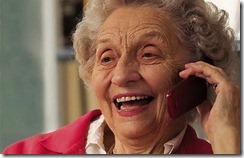 Many single or widowed seniors continue to live in their home well into their 80s and 90s. In fact, living alone has become more common for all age groups over the past 50 years.
Many single or widowed seniors continue to live in their home well into their 80s and 90s. In fact, living alone has become more common for all age groups over the past 50 years.
Single seniors who are older and consciously make the choice to live in their own home in later years often do so because they feel a sense of comfort, routine and familiarity. Their home may have been a place where memories were created— husbands and wives shared dreams, children were raised, family meals were served and friends gathered.
Over time the aging process forces most seniors living alone to make small accommodations to address physical changes. The television volume may be higher; hard-to-reach shelves may be used less frequently, and commonly used items may be left out rather than being put away every day.
There is one consequence of physical change due to aging that is harder to address—falling in the home. Changes in vision, dizziness from medications, reduced strength or balance, and hazards around the home make falling a widespread problem.
According to surveys, 20 to 30 percent of seniors fear falling, and that fear is not unfounded. The Centers for Disease Control and Prevention says half of adults over 80 fall each year and half of all falls happen in the home.
Alarming as these facts are, these documented statistics underestimate the actual number because many falls are unreported by seniors and unrecognized by family members or caregivers.
According to the New England Journal of Medicine, the average time spent incapacitated when a fall occurs in the home is 18 hours.
More and more seniors are addressing their concerns by wearing a personal emergency response system. We’ve all seen the commercial “I’ve fallen and I can’t get up,” where the senior presses a button and help is summoned. PERS pendants and wristbands can help seniors feel protected and remain independent.
PERS accessories are an excellent tool to give seniors the confidence to remain at home as they age. Advanced emergency response systems don’t require the senior to press a button; the system automatically detects the fall.
While the response systems are an increasingly popular choice by seniors and concerned loved ones, a PERS device can only offer protection if it is worn. Studies show that about half of the people who own them do not wear them.
Henry Chan’s mom, Kam Ping (K.P.) is 86 and lives alone in Vancouver, B.C. While K.P. wears her PERS pendant each day, Henry was looking for additional ways to increase his and his mother’s peace of mind.
Chan, a retired Verizon senior analyst living in Thousand Oaks, developed a telephone monitoring service that checks in with a senior according to a schedule of their choosing. When the senior is unable to answer the automated call, someone they know would be contacted to check on them.
K.P. has been using the system for three months.
“The daily calls are reassuring to me,” she says. “I know if I couldn’t answer, my daughter would try to call me or come by to see if I was okay.”
K.P. also likes that the call is a recording, so she can just hang up right away.
Chan named the free service CareRinger.
“CareRinger is not intended to replace a PERS,” he said, “but to be another tool to reassure seniors living alone.”
In partnership with Senior Concerns, Chan will launch a pilot program of CareRinger beginning in September. For more information or to be added to the pilot, call Lori Bliss at (805) 497-0189.
Feelings of comfort and independence, combined with memories and a social network, keep seniors in their homes. Feeling safe, minimizing worry and giving peace of mind to yourself and your family will benefit everyone involved.
As the adage goes, “Better to be safe than sorry.”




